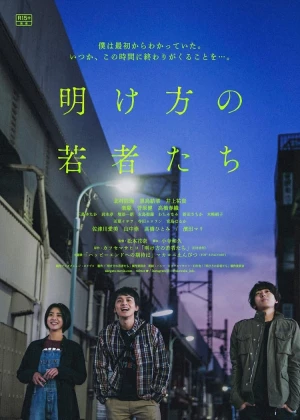The End of the Pale Hour

Dramas are the cornerstone of Japanese cinema, though most are aimed at the local market (with some international festival exposure for the lucky few). Hana Matsumoto's The End of the Pale Hour [Akegata no Wakamonotachi] is one of the better ones I've seen of late, even if it's not a film that jumps out immediately. There's some buried appeal for those willing to make the effort and fans of Japanese dramas should definitely go the extra mile to watch it, but safe to say it's not the type of film you're going to bump into by accident.
![screencap of The End of the Pale Hour [Akegata no Wakamonotachi]](/thumbs/img/articles/1200xauto/end-pale-hour-1.webp)
There has been a noticeable shift toward stories about people in their twenties, as they leave school and start to figure out the rest of their lives. Sho Miyake's And Your Bird Can Sing is another notable example, as is We Couldn't Become Adults. The End of the Pale Hour fits in snugly with these types of films, where people invariably crush their own dreams and hopes by making concrete life choices. It's certainly a nice change of pace from the endless high school dramas that dominated Japanese drama cinema in the years before.
The End of the Pale Hour comes with an extra layer of drama, though it would be unfair to spoil its exact nature in this review. For those of you slightly worried, I can say it's not the sudden reveal of a medical condition (too many of those already), but it's an equally impactful twist that turns the remainder of the film upside down. Matsumoto is pretty open about her misdirection, instantly revealing what moments had been cut from the story to ensure the impact of the reveal. Once that is done, a new chapter starts, putting the audience in a very similar state of mind as the lead character.
At a graduation party, a young man bumps into the girl of his dreams. It's love at first sight and she seems interested in him too. The boy is hopeful that he can change the printing business, but he quickly discovers that corporate life isn't what he thought it would be. He starts all the way at the bottom of the corporate ladder, in the services department. An old friendship and his newfound love keep him cheery when work is dragging him down, but there's something structural that undermines his romance. Even so, life goes on and he has no choice but to power through, no matter how tough things get.
![screencap of The End of the Pale Hour [Akegata no Wakamonotachi]](/thumbs/img/articles/1200xauto/end-pale-hour-2.webp)
I'm always happy to see a drama make a bit of an extra effort to look good. It's not that The End of the Pale Hour goes above and beyond to stand out, but the cinematography is slick and polished and there are a handful of scenes that went the extra mile with lighting and color choices. These moments offer up a slightly dreamier atmosphere that makes for a nice change of pace from the colder, more grounded, and realistic foundation. It's not the most visually arresting film out there, but it's still a step up from most of its peers.
The soundtrack is also pretty standard for a drama, though it is pretty obvious that we're dealing with a younger director. There isn't that much in the way of an actual score, it's mostly just ambient sounds. But when music is added to the film (outside of some pop songs that are worked into the narrative) it feels a bit more contemporary than usually the case, thanks to slight electronic influences. It's just a minor thing and you probably wouldn't even notice outside of the context of the film, but since the medium is so slow to adopt new things, it is a net positive.
Takumi Kitamura is somewhat of an acquired taste, as he often looks a little lost, but that really suits his character this time around. Yuina Kuroshima does an excellent job as his mysterious love interest, whereas Raiku is perfectly cast as Kitamura's best friend. There are no truly outstanding performances here, but the entirety of the cast is on point and they all bring out the best in their characters. There's also enough synergy between them to bring their onscreen relationships to life, which is quite essential for this type of film.
![screencap of The End of the Pale Hour [Akegata no Wakamonotachi]](/thumbs/img/articles/1200xauto/end-pale-hour-3.webp)
The End of the Pale Hour isn't the first drama to try and pull out the rug from under its audience, whether these attempts are successful usually depends on how invested you are in the drama at that point. Though by the time the twist came around I'd already figured out something was off (the signs were there, there was a lingering unease from the very beginning), it still hit me full on, meaning Matsumoto had been doing something right. I was more surprised by the fallout of the big twist, which took the story in a less predictable direction. A brave move that felt pretty fresh.
As is the case with many Japanese dramas, the devil is in the details. From afar, the End of the Pale Hour looks like a pretty standard film, nothing you haven't really seen before. Granted, the execution is slick, the performances are strong, the score is a bit more refined and the themes are handled with the proper respect and gravitas. But it's these little moments where the film makes slightly different choices that set it apart from its peers. It won't win over people who don't have any affinity with the genre, but those who hold it dear do have something to look forward to.